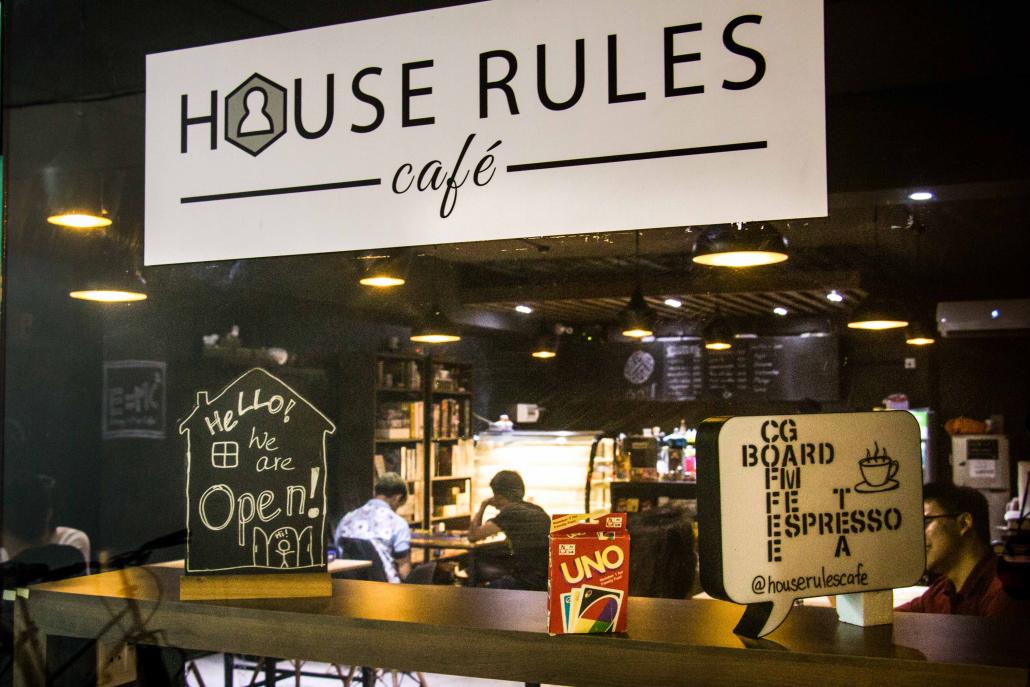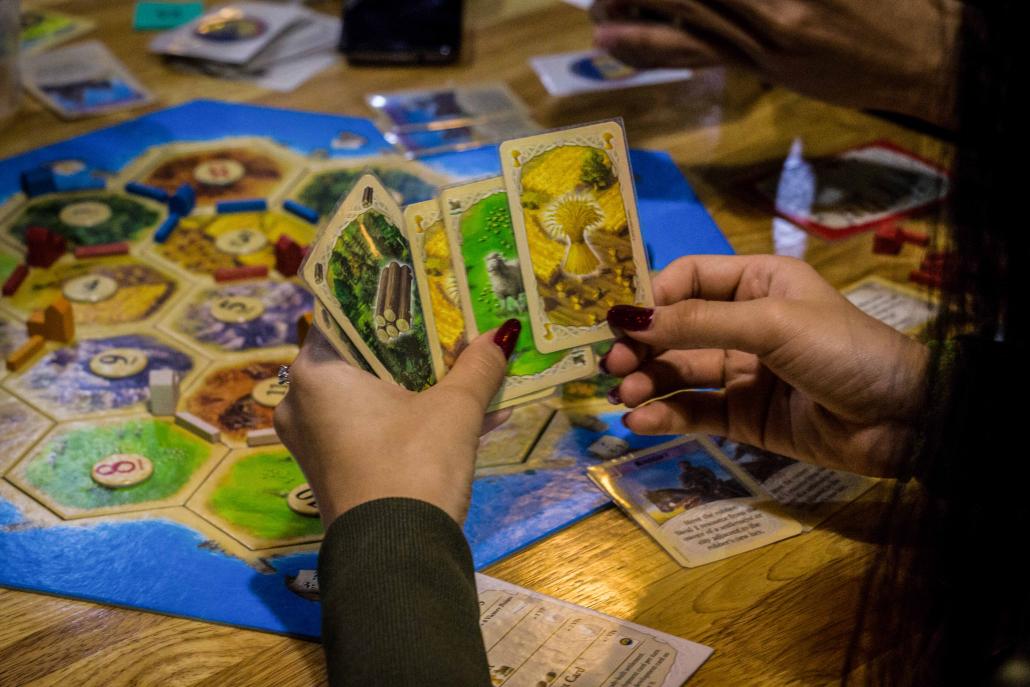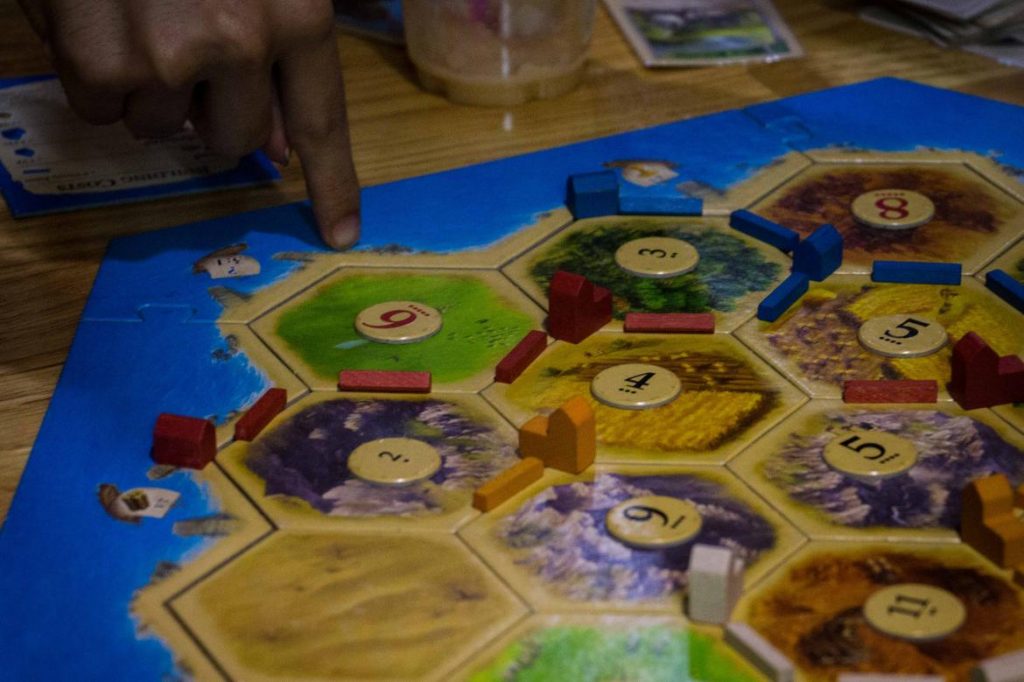Repats have brought a global craze for board games to Myanmar, and despite many hurdles they are growing in popularity in Yangon.
By JUSTIN PUN | FRONTIER
THE SMALL cafe in Pearl Condominium is mostly unremarkable, its trendy black walls decorated with messages in white chalk announcing the opening hours and drinks list. A small cabinet at the counter displays a range of cakes and other snacks.
But then there are the board games, which fill row after row of shelves. House Rules is the first and only cafe in Yangon dedicated to giving gamers a place to play and socialise over cakes and coffee.
Many come with friends and family to relax, co-owner Ma Su Mon told Frontier. Children as young as eight or nine bring along their parents and play together for hours on end. “Families prefer board games over video games because they’re physical and allow more interaction with family members,” she said.
The recent uptake of board games in Yangon has been sparked largely by “repats” like Su Mon – Myanmar people who have returned home after studying or working abroad. They then share their passion with friends, family, and anyone else interested in trying it out.
nswks-17.jpg
Support more independent journalism like this. Sign up to be a Frontier member.

Su Mon Win started House Rules after she returned from studying in the United States, where she had been introduced to board games like Catan. (Nyein Su Wai Kyaw Soe / Frontier)
Board games – which typically but not always feature dice, cards, moveable pieces and a playing board – might seem anachronistic in an age when nearly everyone has a computer, console, or phone capable of playing the latest video games. But while video games continue to grow in popularity, board game sales have also risen in recent years, particularly among independent game manufacturers targeting a niche demographic.
At House Rules, many of the players are aged in their 20s and 30s. It’s a mix of repats, other Myanmar and foreigners. The most popular game is Settlers of Catan – a resource management game. One of the most popular board games globally, Catan is also the one that first fired Su Mon’s passion while studying in the US.
The daughter of a diplomat, she said she “always had the luxury to be exposed to different things” when she was growing up. “But I never managed to get exposed to board games. Not until college did I get my first taste of board games with my friends playing Catan,” she said.
Su Mon returned to Myanmar in 2013 and worked at mobile operator Ooredoo for 18 months before deciding to set up her café. “I’ve wanted to do this since college, but I wasn’t sure how successful it would be as a business. So I did some market research and found it to be a big hit in recent times, especially in neighboring ASEAN countries.” House Rules would go on to open in May of this year.
But games are not only taking place in public spaces such as cafes. The rise of the internet and Facebook has enabled those with a passion for board games to easily link up online and arrange social gatherings.
Among this cohort is Ma Evelyn Yu Yu Swe, founder of the Myanmar Women’s Self Defense Center and a partner at the Strong Flowers Sexuality Training School. She has had a passion for games since she was a child, when she played an online version of Dungeons and Dragons, but got into board games while studying in the US. After returning earlier this year, she said she was “really lonely for a couple of months”, before discovering – much to her surprise – a keen community of board gamers.
nswks-14.jpg

Board gamers play Settlers of Catan at House Rules. (Nyein Su Wai Kyaw Soe / Frontier)
“I played some of my games with my little brothers,” she said, “but they couldn’t play all the time. Then I posted in [Facebook group] Yangon Connection on a whim to see if anyone wanted to meet up to play games.”
It wasn’t long before the messages from fellow fans flowed in. Evelyn Yu Yu Swe eventually created her own group of Myanmar locals, repats, and foreigners, which now meets every week.
“When we first started the club, most of the people had never played much. They were all ‘noobs’,” she said – gamer speak for rookies. “By starting with some of the easy-to-learn games we had on hand, such as Coup and Mafia, we get them familiarised with games and the common mechanics that many of them use.”
While repats have been integral to sparking interest in board games, most of the group’s members have not studied or worked abroad, she said.
Groups such as that started by Evelyn Yu Yu Swe help to share the difficulty and expense of pursuing a passion for games, which can be difficult in a country like Myanmar. Take Warhammer 40,000 (or 40K, as it’s known), a tabletop war strategy game filled with armies of super soldiers, aliens, tanks and vehicles. In order to play, you need a copy of the rule book, the models of your chosen army and the paint needed to properly decorate your models. All of this can cost hundreds of US dollars.
This hasn’t stopped Ko Gon Kyaw Zaw Han, a medical student about to graduate from University of Medicine 1 in Yangon. He set up the Myanmar Warhammer 40K Modelers and Gamers community earlier in September.
“Setting up a group [is not going] be easy,” he told Frontier. “[Warhammer] 40K is a niche [within] a niche. Now the books and video games, these are easy to get into. But for the scale models and tabletop games, the barrier of entry is really high. You can’t get them digitally, and it’s not easy to get them to ship to Myanmar either. The rules and lore, painting the models, etc. can be overwhelming for people interested [in playing the game] … not to mention the price point.”
nswks-9.jpg

Nyein Su Wai Kyaw Soe / Frontier
But it’s not just games as intricate as Warhammer that are hard to find. Most toy stores in Myanmar only stock the most famous games, such as Monopoly and checkers. Anything of more recent vintage – such as Catan – will require a trip to Singapore or Thailand. Expect to pay anywhere from $20 to $100, and that’s if you can find what you want.
“Everywhere I travel, I always try to do research on the board game market there,” Su Mon said. “Thailand, Singapore, even when I was on vacation in Vietnam. I went to all the board game stores and talked to the owners, trying to find the right games to bring back. But buying everything is … [a good way] to make you broke.”
Evelyn Yu Yu Swe had it a bit easier. “When my cousins flew in from the States, one [piece] of their checked luggage was just a giant box of games I left behind. It was ridiculous. Now, thankfully, our group’s individual members buy games themselves, so the cost is spread out,” she said.
As well as providing a social experience, board games require players to communicate both the game’s rules and their actions to others as clearly as possible. This has not gone unnoticed in the business world, where managers and owners need teams that can work and communicate together.
Ma Myat Hnin Phyu, project lead of iDigitalish and a regular customer at House Rules, often brings her team of marketers and consultants to the cafe to bond and develop their team dynamic.
And her organisation is not the only one to see potential advantages from playing board games. Since starting House Rules, Su Mon Win has run board game-focused workshops for AYA Bank and Connect Institute aimed at building camaraderie while also developing critical thinking skills.
But not all see the value. There’s still a widely held perception that board games are for children, and adults who play are immature. This is in part due to a lack of appreciation at the complexity of modern board games; many people in Yangon have only played chess, checkers, snakes and ladders, Monopoly, and maybe a bit of Uno.
Gon Kyaw Zaw Han said it common for people to describe board games as “geek stuff” and a “waste of time and money”, while Su Mon Win said people had described them to her as “childish”. It’s perhaps for this reason that gamers said it was most difficult to get players for role-playing games, which require a significant degree of creativity and suspension of belief.
As more people take up board games, perceptions are likely to change. But to get more participants, the “barriers to entry” that Gon Kyaw Zaw Han identified need to be lowered.
A way of buying the games locally would be a good start. “We do hope more hobby game stores will open up as Yangon develops and more people will become interested,” he said.
There’s almost an evangelical fervour to those who have become hooked on board games. Su Mon Win of House Rules said she wanted to help generate a spirit of adventure and discovery through gaming.
“It’s a whole new world for [Myanmar people],” she said. “I want to spread this hobby around … I hope to one day inspire others to create games in Myanmar. To show people that there can be a future career in other fields than just business or medicine. Art and game design are all possible ways to make a living.”
Su Mon Win hopes to achieve this by not only providing access to games, but also by translating them into Myanmar language. She plans to start with Catan.
Evelyn is just getting started with her group. “Hopefully we can hold full tournaments of Magic: The Gathering and others, though not for a long time.” She laughed, adding: “For now though, we just want to hang out and have fun.”
Top photo: Nyein Su Wai Kyaw Soe / Frontier



